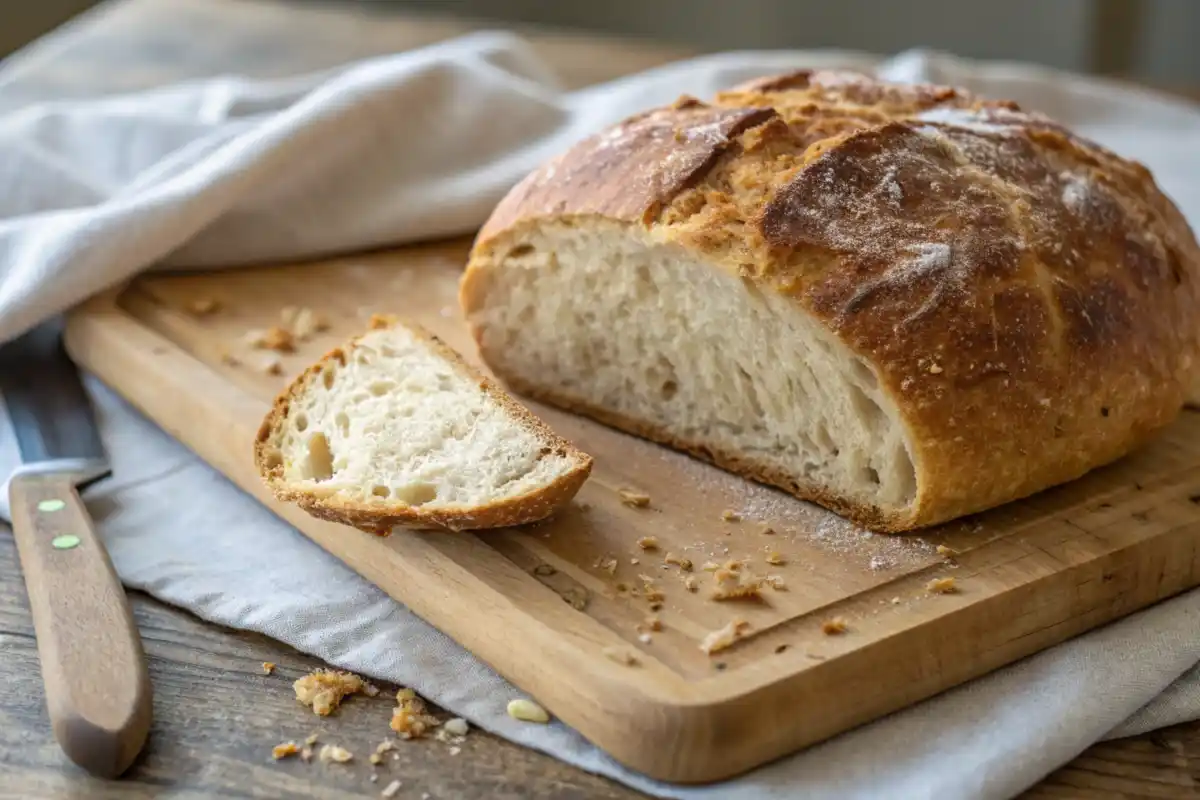Discover why sourdough is good for breakfast, its health benefits, versatile meal ideas, and simple tips to add it deliciously to your morning routine.
Introduction
Is sourdough good for breakfast? Many people seek a tasty morning option that offers both nutrition and satisfaction. Sourdough bread, made through natural fermentation, fits this need. It provides a delightful tang, health perks, and wide versatility. Moreover, it creates a comforting start to your day. In the following sections, we will explore its nutritional value, flavor, serving suggestions, and expert tips. Altogether, you will discover how sourdough can upgrade your morning routine.
Is sourdough good for breakfast? Understanding Its Basics
Is sourdough good for breakfast? Unquestionably, yes. But before we delve deeper, let’s define sourdough. Basically, it is a bread produced through the fermentation of dough using wild yeasts and friendly bacteria. Comparatively, unlike regular bread that relies on commercial yeast, sourdough develops through a natural starter. Consequently, the resulting loaf has a unique tanginess, chewy crumb, and crisp crust. Undoubtedly, sourdough’s history spans centuries, rooted in ancient traditions where bakers cherished slow fermentation.
Is sourdough good for breakfast? The Fermentation Factor
Is sourdough good for breakfast? Indeed, the fermentation process is key. Because of this natural fermentation, beneficial acids form. Consequently, these acids lower the bread’s pH and may enhance mineral absorption. Equally important, fermentation breaks down complex starches, resulting in easier digestion. Therefore, enjoying sourdough in the morning can support gentle energy release and improved gut health. Furthermore, the subtle tang you taste comes from lactic acid bacteria, making every bite flavorful.
Types of Sourdough Starters
Initially, sourdough starters can vary, influencing flavor, texture, and nutrient density. For example, a whole wheat starter provides more fiber and earthiness. Conversely, a rye starter delivers complex, deep flavors. Meanwhile, white flour starters create a milder taste and fluffier crumb. Basically, the choice of starter affects how well your morning toast pairs with different spreads. Consequently, experimenting with various starters can help you find your perfect breakfast bite.
Understanding the Role of Wild Yeasts
While conventional bread depends on commercial yeast, sourdough thrives on wild yeasts in the environment. These wild yeasts interact with lactobacilli, creating a complex flavor profile. Explicitly, the symbiotic relationship produces subtle acidity and a chewy texture. Meanwhile, these natural yeasts may improve digestibility. Altogether, this results in a breakfast bread that feels lighter and more satisfying.
Nutritional Profile and Health Perks
Sourdough is nutrient-rich, providing complex carbohydrates, protein, and essential minerals. Specifically, it often has a lower glycemic index than regular white bread, which, according to Harvard T.H. Chan School of Public Health, can help maintain steady blood sugar levels throughout the morning. Especially when paired with protein-rich toppings, it encourages balanced energy release. Because sourdough involves fermentation, beneficial bacteria help pre-digest some of the starches. Hence, your body may absorb nutrients more efficiently. Comparatively, the presence of B vitamins, iron, and magnesium further supports general health. Eventually, choosing sourdough can help improve gut microbiome diversity. Therefore, starting your day with a slice can be both enjoyable and nutritious.
Tasty Serving Options for Your Morning Meal
Another reason is sourdough good for breakfast? lies in its versatility. Undoubtedly, sourdough toast pairs well with countless toppings. For instance, try avocado for healthy fats, nut butter for protein, or fresh berries for natural sweetness. Moreover, add a poached egg on top to boost your breakfast’s protein content. Basically, the neutral yet tangy base complements savory and sweet flavors alike.
To simplify your morning, pre-slice your loaf and freeze it. Later, pop a slice in the toaster for a quick, warm treat. Likewise, use sourdough for French toast, blending the bread’s tang with sweet maple syrup. Indeed, the possibilities are endless. Eventually, you will find your signature combination that transforms ordinary mornings into gourmet experiences. check out for more ideas.
Is sourdough good for breakfast? Comparing It With Other Bread Types
Is sourdough good for breakfast? When you compare it with other bread options, sourdough stands out. Generally, white bread can lack complexity and nutrients. Conversely, whole grain bread is wholesome but might not offer the same tangy flavor. Meanwhile, bagels can be dense and higher in refined carbs. Comparatively, sourdough strikes a balance—tasty, nutrient-rich, and pleasantly textured.
Is sourdough good for breakfast? Versus Regular Toast
Is sourdough good for breakfast? Especially when compared to typical store-bought bread. Sourdough’s natural fermentation may result in better digestibility, making it gentler on your stomach. In addition, it often has a chewier texture and richer flavor. While standard toast can be bland, sourdough provides complexity. Thus, it elevates your morning meal from routine to remarkable.
Storing Sourdough for Morning Use
Proper storage ensures your loaf stays fresh. Initially, consider a bread box or breathable bag to maintain the crust. Conversely, plastic can trap moisture, causing mold. Eventually, if you cannot finish it in a few days, freeze slices for quick toasting. Consequently, you will enjoy warm, fresh-tasting sourdough even on busy mornings. Furthermore, proper storage preserves nutrients and flavor.
Creative Toppings to Enhance Flavor
Comparatively, sourdough’s tangy base pairs well with many toppings. Spread creamy goat cheese, sprinkle toasted seeds, or drizzle honey for a sweet-savory contrast. Additionally, fresh herbs, smoked salmon, or a dash of cinnamon can transform your toast. Undoubtedly, variety ensures that you never grow bored. Moreover, adjusting your toppings seasonally adds excitement to your morning routine.
Expert Tips on Storage and Preparation
Professional bakers know how to keep sourdough optimal for breakfast. They recommend storing it at room temperature in a paper or linen bag. Meanwhile, avoid slicing until necessary to preserve moisture. For best results, toast lightly to maintain the bread’s structure. Consequently, you achieve a crisp exterior and tender interior. Eventually, experimenting with toaster settings can fine-tune your results. Indeed, it’s all about small adjustments to get that perfect bite.
For busy mornings, slice and freeze your bread in advance. Next, reheat it directly in the toaster. Likewise, consider warming slices in the oven for a few minutes. Basically, gentle heat revives the crust’s crispness and the crumb’s softness. Furthermore, if you prefer a softer texture, lightly steam it before toasting. Undoubtedly, these small techniques ensure a delightful start to your day.
Is sourdough good for breakfast? Seasonal Flavors and Varieties
Is sourdough good for breakfast? Especially when exploring seasonal flavors. Bakers often incorporate ingredients like cranberries, herbs, or nuts into their dough. Consequently, you can find sourdough varieties that reflect the time of year. Eventually, this allows you to celebrate changing seasons at the breakfast table. Moreover, these breads can add new dimensions of flavor and texture to your routine.
Is sourdough good for breakfast? With Sweet or Savory Additions
Is sourdough good for breakfast? Particularly if you enjoy creative twists. Add sweet toppings like figs and mascarpone for a dessert-like treat. Conversely, choose savory options such as tomato jam, olive tapenade, or a fried egg. Undoubtedly, sourdough’s tang complements both ends of the flavor spectrum. Therefore, you can tailor your toast to match your mood, cravings, or dietary goals.
Seasonal Ingredients to Pair
Consider pairing sourdough with seasonal fruits or vegetables. Initially, in summer, top with ripe strawberries or peaches for fresh sweetness. Meanwhile, autumn calls for apple slices and a sprinkle of cinnamon. Likewise, winter might welcome citrus zest or pomegranate arils. Thus, sourdough’s adaptability lets you showcase nature’s freshest offerings. Eventually, your breakfast becomes a celebration of the season’s bounty.
Making the Most of Leftover Bread
If you have leftover sourdough, do not waste it. Eventually, stale slices make excellent croutons or breadcrumbs. Another option is to transform them into a breakfast strata layered with eggs and veggies. Basically, this reduces food waste and adds variety to your meals. Moreover, leftover sourdough can enhance soups, salads, or even dessert recipes. Undoubtedly, creativity ensures every crumb finds a purpose.
Health Considerations and Dietary Restrictions
Though sourdough may be easier to digest, individuals with celiac disease must still avoid it. Conversely, those with mild gluten sensitivities might find sourdough more tolerable due to partial gluten breakdown. Nevertheless, always consult a healthcare professional if in doubt. Furthermore, choose whole grain sourdough if you prefer extra fiber and nutrients. Undoubtedly, moderation remains key. Additionally, balance your breakfast with protein, healthy fats, and produce for overall wellness.
Sustainability and Sourcing
Opting for locally sourced sourdough can benefit the environment and local economy. Accordingly, many small bakeries use organic flour, traditional methods, and minimal packaging. Consequently, selecting artisanal loaves supports sustainable wheat farming. Thus, you enjoy superior flavor while encouraging responsible food production. Eventually, these choices align with your values and contribute to a more mindful morning routine.
FAQ
Is sourdough bread a healthy breakfast?
Indeed, sourdough bread can be a healthy breakfast choice. Comparatively, it often boasts a lower glycemic index than regular bread. Consequently, it supports balanced blood sugar levels. Additionally, fermentation may improve nutrient absorption. Therefore, pairing it with nutrient-rich toppings creates a well-rounded meal.
Is it OK to eat sourdough bread everyday?
While sourdough can be part of a balanced diet, moderation matters. Undoubtedly, variety ensures you receive a wide range of nutrients. However, if sourdough forms the base of your morning meals, add protein and fresh produce. Accordingly, this helps maintain long-term health and enjoyment.
How to eat sourdough for breakfast?
Initially, start with a toasted slice. Next, add toppings that complement its tangy flavor. For example, try smashed avocado, nut butter, or Greek yogurt. Moreover, explore savory options like smoked salmon or a poached egg. Consequently, simple additions transform plain toast into a gourmet meal.
Is sourdough good for a breakfast sandwich?
Unquestionably, sourdough bread makes an excellent foundation for breakfast sandwiches. Its sturdy structure supports fillings like fried eggs, bacon, spinach, or cheese. Comparatively, the tangy taste enhances savory elements. Therefore, you enjoy a fulfilling, flavorful morning treat. Altogether, a sourdough breakfast sandwich offers a superior culinary experience.
Is sourdough good for breakfast? Final Thoughts
Is sourdough good for breakfast? Absolutely. Generally, its natural fermentation, nutrient profile, and versatile flavor make it a top choice. Furthermore, its digestibility and adaptability allow you to explore sweet, savory, and seasonal toppings. Eventually, this transforms your morning meal into something special. Consequently, choosing sourdough can bring delightful variety and nutritional value to your daily routine. Finally, experiment with different loaves, toppings, and preparation techniques. Undoubtedly, you will discover that sourdough elevates breakfast from ordinary to extraordinary.
conclusion
Is sourdough good for breakfast? Unquestionably, yes. This naturally fermented bread, with its distinctive tang and chewy texture, adds a layer of depth to your morning routine. When compared to standard breads, sourdough often contains more easily digestible nutrients, potentially offering enhanced energy and gentler effects on your stomach. Moreover, its versatility ensures that it never grows dull. You can enjoy it plain, topped with sweet fruit preserves, or paired with savory ingredients like smoked salmon and fresh herbs. These endless possibilities encourage creativity and experimentation, allowing you to adjust your breakfast to personal tastes and dietary preferences. Equally important, sourdough often aligns with sustainable food practices, especially when sourced from local bakeries that use artisanal, eco-friendly methods. Ultimately, this bread’s unique flavor, nutrient profile, and adaptability make it a worthy addition to your daily menu. With sourdough, mornings transcend the ordinary, evolving into truly satisfying and memorable culinary moments.

